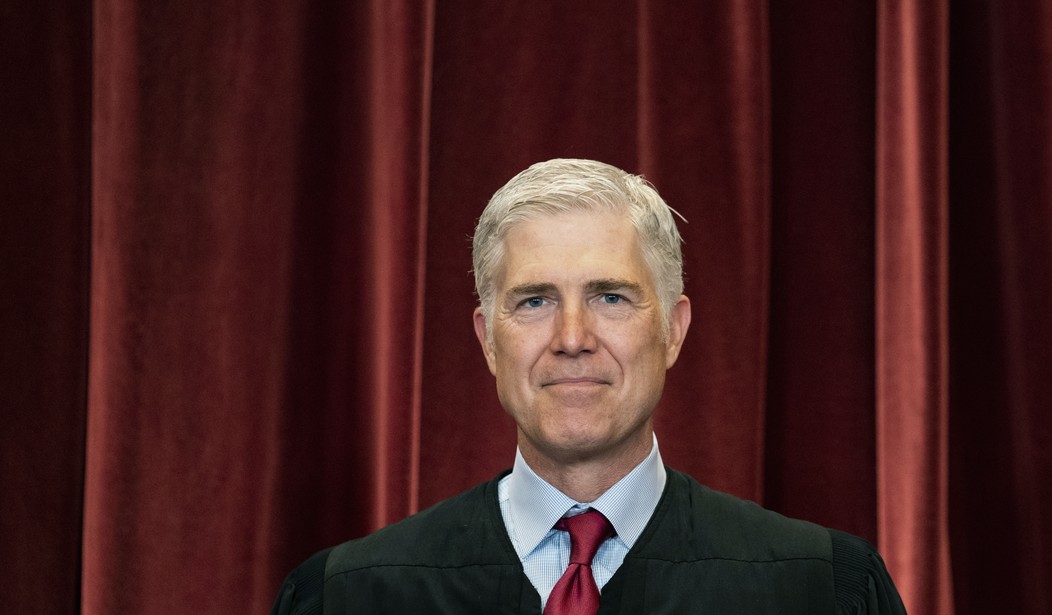We have far too many laws in this country, and we would be far better off if we did away with most of them. Unfortunately, there are few politicians who desire to undertake such an endeavor.
Earlier this month, Supreme Court Justice Neil Gorsuch discussed this problem at the Ronald Reagan Presidential Library & Museum in Simi Valley, California. During the conversation, Gorsuch brought up his new book “Over Ruled: The Human Toll of Too Much Law,” in which he lays out the case for fewer laws.
The justice explained that many professors “say that there are now so many federal laws on the books, crimes, that every American over the age of 18 commits one felony a day” and pointed out that between 1970 and today, “we’ve seen maybe a doubling in the number of federal crimes on the books.”
He’s right. In an op-ed for The Atlantic, Gorsuch and his co-author Janie Nitze detailed how the number of federal laws has ballooned.
Our country has always been a nation of laws, but something has changed dramatically in recent decades. Contrary to the narrative that Congress is racked by an inability to pass bills, the number of laws in our country has simply exploded. Less than 100 years ago, all of the federal government’s statutes fit into a single volume. By 2018, the U.S. Code encompassed 54 volumes and approximately 60,000 pages. Over the past decade, Congress has adopted an average of 344 new pieces of legislation each session. That amounts to 2 million to 3 million words of new federal law each year. Even the length of bills has grown—from an average of about two pages in the 1950s to 18 today.
“The argument is that we need those things to keep us safe, to regulate pollution and drugs and all kinds of things,” Gorsuch said. “So where did we cross the line from valuable society protecting regulation and laws to something that has blossomed into a situation where we can’t even know that we’ve crossed the line?”
“On the one hand, we need laws to keep us free and safe. On the other hand, if you have too many laws, you impair those same freedoms…because who can deal with the world with so much law? James Madison said it’s going to be money and connections and as a judge, now for 18 years, I just came to see case after case in which ordinary Americans just trying to live their lives, not hurt anybody, raise their families, were just getting whacked. Case in which ordinary Americans just trying to live their lives, not hurt anybody, raise their families, were just getting whacked by laws unexpectedly.”
Justice Gorsuch is talking exactly about what happened our friend Dexter Taylor pic.twitter.com/eTOhai0jDL
— Joe Lnu (@joe_Lnu) August 26, 2024
Gorsuch is not wrong. America has far too many laws. What makes this even more disturbing is that he was only talking about federal laws. We have plenty more at the state and local levels that are likely unnecessary overreaches.
Dexter Taylor became a victim of New York’s obsession with unnecessary and unconstitutional laws restricting the right to keep and bear arms. He is now in prison, serving a ten-year sentence just for building his own guns. If you’re unfamiliar, you can read about his story here and here.
There is also the case of North Carolina resident Susan Hogarth, who could be facing jail time for – wait for it – taking a selfie at the ballot box after voting.
The United States was founded on the principles of liberty and self-governance. Today, we find ourselves ever so much further from these ideals. With countless laws seeming to govern almost every aspect of life, Americans are increasingly restricted by a web of arbitrary legal constraints.
The impact of excessive laws has a debilitating effect on innovation and entrepreneurship. Small businesses often struggle to navigate the complex regulatory environment. Federal regulations alone cost the U.S. economy over $1.9 trillion each year, according to the Competitive Enterprise Institute.
An overabundance of laws not only expands the power of the state, but it also cultivates an environment rife with corruption. Civil asset forfeiture is a prime example of this. These laws in several states have enabled law enforcement to steal property from citizens without ever charging them with a crime.
More laws grant the government a type of unchecked power to threaten civil liberties and natural rights. It creates a system in which justice is arbitrary and dependent on the whims of those in power. Slashing these laws would limit the potential for abuse and corruption.
The bottom line is that when more laws are passed, the state becomes even more of a behemoth used to pursue tyrannical ends. If we want a less corrupt and unjust government, we must strip it of its power by doing away with or nullifying laws that empower it.













